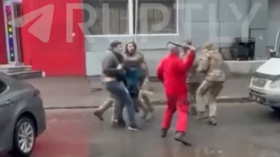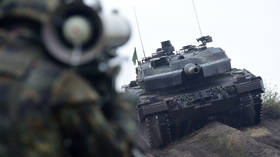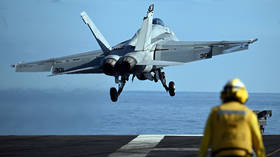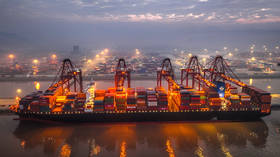Saudi Arabia moves ‘strike force’ to border with Yemen as truce nears – report
Saudi Arabia has moved its “strike force” to its border with Yemen, according to local media. Although a five-day truce is looming, the Saudi-led coalition and Houthi rebels are continuing to trade heavy fire.
Al Arabiya TV showed a column of tanks being moved atop military trucks, describing the scene as “the arrival of reinforcements from the strike force to the border.”
The “reinforcement” move followed the intense artillery and rocket battles across the border earlier Monday.
The Saudis have reportedly fired more than 150 rockets targeting Yemen’s Saada and Hajjah provinces. The coalition’s planes were reported to have struck Houthi positions in the central city of Taiz as well as in Marib, the oil-producing province of east of the capital, Sanaa.
READ MORE: Yemeni Houthis share video, images of 'downed' Moroccan F16 jet
The attacks prompted retaliatory fire from the Houthis, who claimed they had fired Katyusha rockets and mortars on the Saudi cities of Jizan and Najran, AFP reported.
The recent exchange of fire comes just a day before the five-day humanitarian truce agreed by both the Saudi-led coalition and Houthi rebels. The ceasefire was scheduled to start Tuesday, but it could be jeopardized by continuing fighting between the two sides.
In a statement Sunday, Houthi forces said they welcomed the truce “that has characteristics that serve the welfare” of the nation, but said they would respond to any violations of the ceasefire.
The short humanitarian truce would halt airstrikes that Saudi Arabia and its allies have been carrying out for over six weeks.
But five days might not be enough to “cover the whole of Yemen,” Iyad Nasr, the regional spokesperson for the United Nations, told RT.
“But at least we are looking at the accessing the situation on the ground, providing basic and life-saving operations to the Yemenis and priority areas,” Nasr said. “Additionally, we are seriously considering bringing aid supplies and fuel into Yemen from outside the country. This is a part of the humanitarian pause that we are looking forward to have in Yemen.”
The devastation caused by the bombardment aroused criticism from UN officials who believe the bombing to be a breach of international law.
"The indiscriminate bombing of populated areas, with or without prior warning, is in contravention of international humanitarian law (IHL)," said Johannes van der Klaauw, the UN Humanitarian Coordinator for Yemen. "Issuing warnings of impending attacks does not absolve the parties of their IHL obligations to protect civilians from harm."
READ MORE: Yemen’s Houthis agree to 5-day truce proposed by S. Arabia
"Many civilians are effectively trapped in Sanaa as they are unable to access transport because of the fuel shortage. The targeting of an entire governorate will put countless civilians at risk," Van der Klaauw said.
There are severe shortages of food and other resources, RT learned from the locals in Sanaa.
Diesel and other fuels are at an all-time low, with people having to resort to firewood. The fuel crisis “has affected everyone,” Abdullah Harazi, a bakery owner, said. “It has paralyzed public life, but we have to provide for our families and work with whatever we have, as long as we are alive.”
“We used to run our heating system on diesel, but due to the fuel shortage and the rising price of firewood, we started using discarded motor oil as fuel for the heating system… for the moment, that is the best solution for us to keep our family going and get through this crisis,” said Mohamed Ghazi, who owns a traditional public bath.
Meanwhile, over 1,250 have died since the start of the operation on March 26 and more than 5,000 have been wounded, according to the World Health Organization. Local estimates of casualties are much higher.












